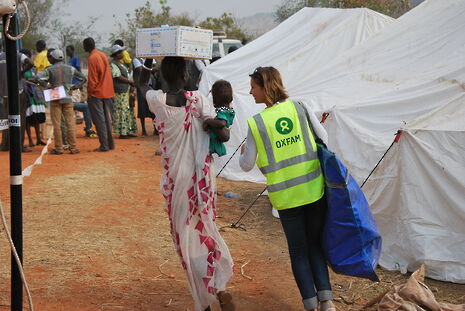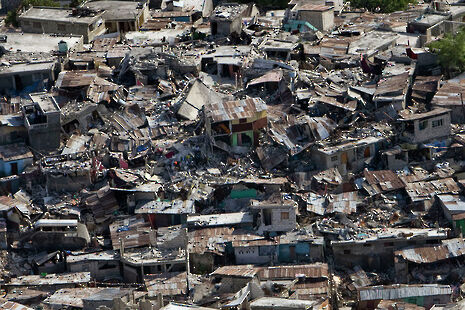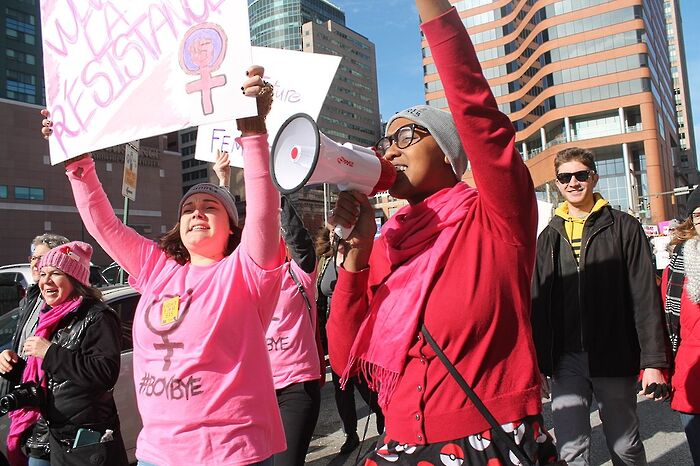For the benefit of the most vulnerable, Oxfam must recognise its mistakes and improve
In the wake of scandal surrounding alleged exploitation and serious sexual misconduct by Oxfam employees, Jemma Slingo suggests the organisation must confront the realities of aid work

Perhaps it was only a matter of time. Westminster, Hollywood, the Church, the BBC and other institutions too numerous to mention have been engulfed by the miasma of sexual scandal in recent years. Until last week, the charity sector had remained untarnished. Now, there is yet another black mark against a once reputable industry.
I’m referring, of course, to the accounts of alleged exploitation on the part of Oxfam employees. On Thursday 9 February, The Times reported accounts of serious sexual misconduct carried out by a group of male aid workers living in an Oxfam residence in Haiti. The men are said to have paid women - who were potentially underage - for sex, and to have held ‘Caligula orgies’ in the Oxfam owned villa. Following The Times’ report, fresh claims have emerged, cover-ups have been denied and resignations have been filed.
Although Oxfam is joining a host of other disgraced establishments, there is something particularly problematic about the discovery of abuse in the aid sector. The revelations blur the comfortingly stark distinction we draw between good and bad. They force us to reconcile moral extremes: how can a good organisation, rooted in altruism, be simultaneously rotten? And, more importantly, how do we respond to such a discrepancy?
It is only by recognising its immorality that Oxfam can become a truly moral organisation.
The exploitation of citizens in disaster zones is repugnant in the extreme. Late last week, Mary Beard provoked rage when she tried to contextualise the aid workers’ behaviour. She tweeted ‘Of course one can’t condone the (alleged) behaviour of Oxfam staff in Haiti and elsewhere. But I do wonder how hard it must be to sustain “civilised” values in a disaster zone. And overall I still respect those who go in to help out, where most of us w[oul]d not tread.’ She argues that disaster zones must necessarily brutalise the people who inhabit them. But the very purpose of aid workers is to bring food, rebuild shelter, dispense medicine; they are not meant to amplify the aftershock. Moreover, the actions of the employees in question cannot be reduced to, or explained by, the situation they found themselves in. No sociological conditions can justify their abuse of power.
One doesn't have to sympathise with Mary Beard’s remarks to recognise that she raises an important point, however. It reminds us that, on the whole, Oxfam is a moral and deeply humane organisation. The charity’s long track record - it celebrated its 75th anniversary last year - for improving dire situations and bringing relative comfort to the world’s most vulnerable cannot be forgotten. The comedian Simon Pegg has stood firm as an ambassador for the charity for this very reason. Whilst a number of celebrities have distanced themselves from Oxfam, Pegg declared that ‘It’s an extraordinary charity’, adding ‘I respect [it] enormously and the people that I’ve always dealt with have been nothing short of heroes to me’.

His sentiments are far from universally shared. In the past week, there have been a number of politically motivated swipes at the charity sector, which have harnessed the energy of the Oxfam scandal. A day after the news broke, Jacob Rees-Mogg arrived at Downing Street to present a petition demanding cuts to the foreign aid budget. The petition - which screamed ‘Stop the Foreign Aid Madness’ - was signed by more than 100,000 Daily Express readers. The Conservative right is using the reputational damage suffered by Oxfam to diminish the importance of charity work in general. They cannot be allowed to succeed. In this globalised age, and as a wealthy ‘western’ country, we have a responsibility and an obligation to offer help to those who need it.
However, it is because the aid sector is a fundamentally good, necessary thing that we need to recognise its capacity for wickedness. We cannot simply dismiss the small group of shamed aid workers as blots on an otherwise stainless page. Charities - like all organisations - have the potential to foster abusive behaviour.
This is partly due to the fact that aid workers possess enormous power; for people in desperate circumstances, they are often the only source of essential supplies. This skewed power dynamic is unavoidable; an aid mission is all about helping, but helping necessarily implies helping from a position of power. The exercise of power, however - even for well-intentioned, benevolent reasons - can lead to its abuse. Indeed, it is possible that, in the eyes of exploitative aid workers, the admirable, traumatic nature of their work justifies lapses of moral judgement. I am not suggesting that this outlook, with its unpleasant colonial tint, is shared by the majority of the charity sector. Far from it. However, it goes some way to explain the pockets of abuse that have emerged in disaster zones.
There is also the problem surrounding whistleblowing. In the past year, a culture of silence has been broken. The #MeToo campaign has seen survivors of sexual violence speak out against harassment, exploitation and assault. However, the campaign spotlights how pervasive and stubborn silence can be. Many women were unable to talk about their experiences for years, decades even. What’s more, people who knew what was going on did little to raise the alarm. This last point is important when thinking about disclosure in the charity sector. If people struggle to talk about abuse that occurs in ordinary workplaces, what happens if your workplace is a war-torn city, or a demolished Haitian town? In such extreme circumstances, the levels of trust and emotional support demanded of one’s colleagues must be extraordinary. It must take a huge amount of strength, therefore, to speak out against one’s co-workers. This does not mean that people will remain mute out of bonded solidarity. Indeed, the shock of betrayal might prompt them act. Nevertheless, the intense social dynamic of aid work should not be ignored.
Oxfam needs to acknowledge that the nature of charitable work can result in the exploitation of those it seeks to help. It needs to combat the weak spots inherent to the aid sector. Indeed, it is only by recognising its immorality that it can become a truly moral organisation
 News / Uni Scout and Guide Club affirms trans inclusion 12 December 2025
News / Uni Scout and Guide Club affirms trans inclusion 12 December 2025 News / Pembroke to convert listed office building into accom9 December 2025
News / Pembroke to convert listed office building into accom9 December 2025 Features / Searching for community in queer Cambridge10 December 2025
Features / Searching for community in queer Cambridge10 December 2025 News / Uni redundancy consultation ‘falls short of legal duties’, unions say6 December 2025
News / Uni redundancy consultation ‘falls short of legal duties’, unions say6 December 2025 News / Gov declares £31m bus investment for Cambridge8 December 2025
News / Gov declares £31m bus investment for Cambridge8 December 2025









